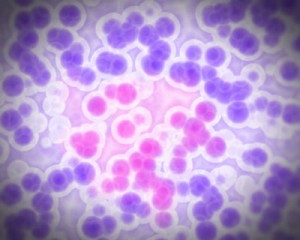FDA grants Breakthrough Therapy Designation for venetoclax in 17p deletion relapsed-refractory chronic lymphocytic leukaemia
Posted: 7 May 2015 |
The FDA has granted Breakthrough Therapy Designation for venetoclax for the treatment of people who have relapsed or refractory CLL with 17p deletion…


US Food and Drug Administration (FDA) has granted Breakthrough Therapy Designation for venetoclax, an investigational medicine being developed by Roche and AbbVie, for the treatment of people who have relapsed or refractory chronic lymphocytic leukaemia (CLL) with a genetic abnormality known as 17p deletion.


Breakthrough Therapy Designation is designed to accelerate the development and review of medicines intended to treat serious and life-threatening diseases with evidence showing that the medicines may provide a substantial improvement over current treatment options.
“People who have relapsed or refractory CLL with a 17p deletion typically have a poor prognosis, and do not respond to many currently available treatment options,” said Sandra Horning, MD, Roche’s Chief Medical Officer and Head of Global Clinical Development. “We are pleased that the FDA has granted venetoclax Breakthrough Therapy designation and hope this regulatory pathway will help us bring venetoclax to people with this difficult-to-treat disease soon.”
Venetoclax selectively binds and inhibits Bcl-2 proteins
CLL is a slow-growing cancer of the blood and bone marrow that is generally considered incurable, and is one of the most common adult leukaemias worldwide. Most cases of CLL (95%) start in white blood cells called B-cells. In certain cases of CLL, a part of chromosome 17 is lost and along with it an important gene that controls apoptosis called p53. The 17p deletion is found in 3 to 10% of previously untreated cases and approximately 30 to 50% of relapsed or refractory cases. People with 17p deletion CLL have poor results with conventional chemotherapy regimens and a median life expectancy of less than three years.
Venetoclax is an investigational small molecule designed to selectively bind and inhibit Bcl-2 proteins, an important regulator of a process called programmed cell death, or apoptosis. These proteins are thought to impact how certain blood cancers form, develop and become resistant to treatment. Bcl-2 proteins are expressed at high levels in CLL, non-Hodgkin’s lymphoma (NHL) and in other cancers caused by blood cells called B-cells. Venetoclax is currently being studied in Phase II and Phase III studies for CLL and in Phase I and II studies for several other blood cancers.



